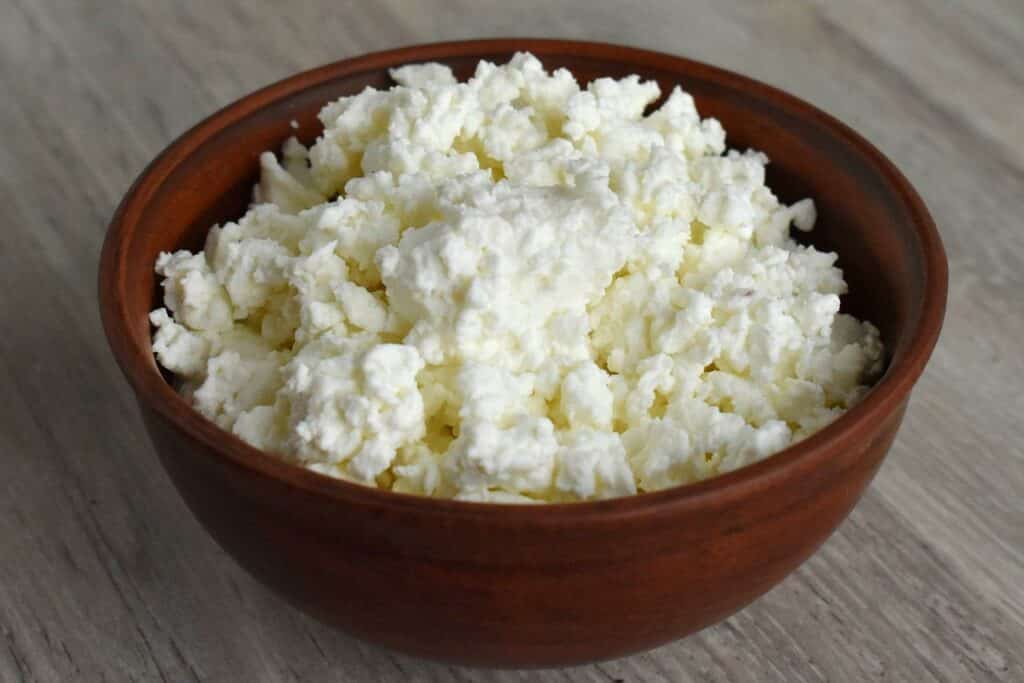Maybe it’s because of those sad puppy eyes looking at you as you enjoy cottage cheese.
Or perhaps the health benefits of cottage cheese, like the high amount of calcium, make you think about your canine friend.
Regardless of the reason, you’re wondering whether your dog will be safe after eating cottage cheese.
So, can dogs eat cottage cheese?
Yes, cottage cheese is safe for dogs as it contains calcium needed for dogs’ strong bone and teeth development.
As a probiotic, cottage cheese is also suitable for your pup’s digestive system.
There are many abenefits associted with feeding your dog cottage cheese.
However, cottage cheese can be harmful to your dog if consumed in large quantities.
Keep reading to know the benefits of cottage cheese and its effects on dogs if consumed in high amounts.

Health Benefits of Cottage Cheese for Dogs
Cottage cheese is an excellent source of:
- Calcium
- Proteins
- Vitamin B12
- Selenium
- Phosphorus
Your canine friend needs these nutrients to stay healthy and promote body processes like development.
Specifically, these nutrients are essential in:
Developing Stronger Bones and Teeth
Our canine friends are used to running and jumping around while biting on different objects.
All that movement requires strong bones to support their body weight and protect them from injury.
Moreover, they need strong bones that will not crack due to excessive bitings.
Cottage cheese is an excellent source of calcium, which is essential for bone and teeth development.
Calcium also helps repair and maintain bones, so it’s vital to have a constant supply of this mineral.

Aiding in Digestive Issues
Cottage cheese contains a good amount of probiotics.
Probiotics are live microorganisms that promote a healthy digestive system.
They do this by maintaining the balance of good and bad bacteria in the gut.
A healthy digestive system is essential for your dog as it aids in nutrient absorption and prevents diseases.
Probiotics also help reduce diarrhea, vomiting, and constipation.
Promoting Metabolism
Efficient metabolism in dogs is critical for the production of enough energy.
Cottage cheese is a good source of selenium, an essential nutrient for metabolism.
Selenium also helps produce thyroid hormones necessary for regulating metabolism.
Vitamin B12 present in cottage cheese also aids in the conversion of fats and proteins into energy.
This vitamin is essential for a dog’s metabolism as it helps them maintain their energy levels.
Phosphorus (dicalcium phosphate) aids in the absorption of calcium and other minerals like magnesium needed for bone and teeth development in dogs.
Furthermore, phosphorus helps produce energy and DNA, which keeps our dogs moving.
Developing a Healthy Nervous System
You may need to train your pup not to jump on visitors or not to bark excessively.
A healthy nervous system is key to achieving this.
Cottage cheese is a good source of vitamin B12, which helps develop a healthy nervous system.
Vitamin B12 also aids in the production of red blood cells and DNA.
Red blood cells are responsible for carrying oxygen to the different parts of the body, including the nervous system.
Sufficient oxygenation is necessary for a healthy nervous system as it helps transmit signals between neurons.
Maintaining a Healthy Skin and Coat
It feels good carrying around a pup with a soft and shiny coat.
Cottage cheese is a good source of proteins, which are essential for the growth and maintenance of skin cells.
Proteins also help in the repair of damaged skin cells in dogs.
A healthy coat is a reflection of your dog’s overall health.
Cottage cheese is also a good source of omega-3 fatty acids, essential nutrients for maintaining healthy skin.
Omega- 3 fatty acids help produce natural oils that keep the coat shiny and soft.
These fatty acids also aid in preventing skin allergies and other inflammatory skin conditions.
Risks of Cottage Cheese for Dogs
Although cottage cheese is safe for your canine, there are some risks you need to be aware of.
They include:
Lactose Intolerance
Some dogs may be lactose intolerant, which means they cannot digest milk products properly.
If your dog is lactose intolerant, feeding them cottage cheese will cause digestive issues like bloating, diarrhea, and vomiting.
Observe your pup’s behavior after eating cottage cheese or other milk products to know if he’s lactose intolerant.
If he shows any of the mentioned digestive issues, avoid feeding him cottage cheese and consult your veterinarian.
Excess Cottage Cheese
Feeding your dog too much cottage cheese can cause them to gain weight.
This is because whole-milk cottage cheese has a high fat content.
Too much cottage cheese can also lead to pancreatitis in dogs.
Pancreatitis is a severe condition that occurs when the pancreas becomes inflamed.
Signs of pancreatitis in dogs include:
- Loss of appetite
- Abdominal pain
- Vomiting
- Diarrhea
- Dehydration
- Fever
- Increased heart rate
If your dog shows any of these signs, immediately take him to the vet.
Unhealthy Ingredients
Some cottage cheese contains unhealthy ingredients like onions, garlic, and artificial flavors.
These ingredients are harmful to dogs.
Always check the label of the cottage cheese before feeding it to your dog to make sure it does not contain any unhealthy ingredients.
Frequently Asked Questions
Does cottage cheese settle a dog’s stomach?
Yes, if fed in moderation, cottage cheese can settle a dog’s stomach.
However, if your dog is lactose intolerant, it will do the opposite.
Can I give my dog cottage cheese every day?
Yes, you can give your dog cottage cheese every day as long as you feed them in moderation.
Too much cottage cheese can lead to weight gain and pancreatitis in dogs.
What kind of cottage cheese can I give my dog?
The best cottage cheese to give your dog is one with low fat content.
Cottage cheese with high fat content will expose your furry friend to pancreatitis and weight gain.
Final Thoughts
Dogs can eat cottage cheese as a treat in moderation.
Cottage cheese contains calcium, proteins, and omega- 3 fatty acids, which are essential for a dog’s health.
It’s worth noting that some dogs may be lactose intolerant.
As a result, you must observe your dog’s behavior after eating cottage cheese.
If he shows any digestive issues, avoid feeding him cottage cheese and consult your veterinarian.
- What Dog Breeds Have Pink Skin? - March 24, 2023
- What Are the Most Inspiring Dog Breeding Quotes? - March 20, 2023
- Can Pheromone Spray Help Improve Dog Breeding Results? - March 19, 2023








